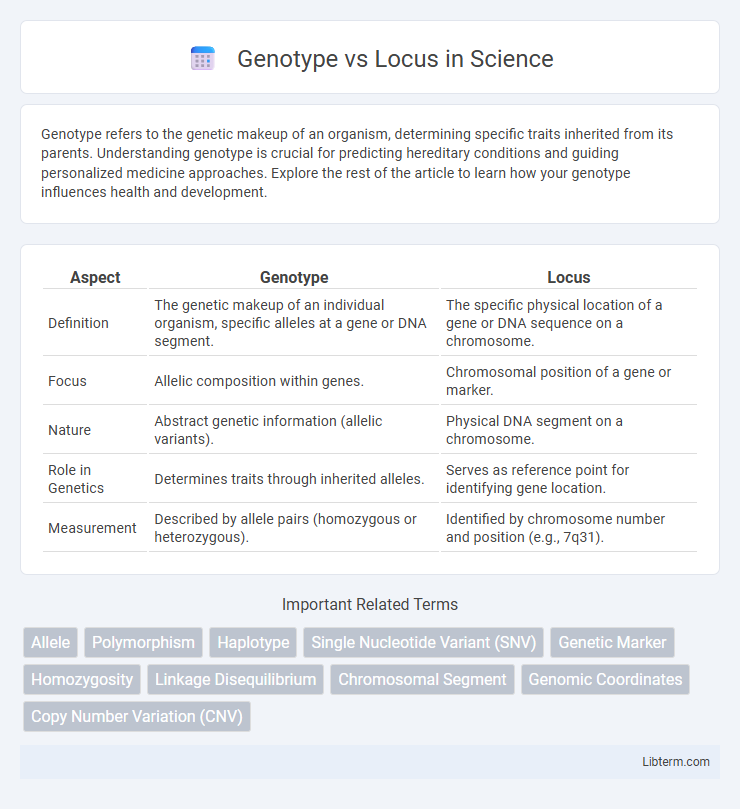Genotype refers to the genetic makeup of an organism, determining specific traits inherited from its parents. Understanding genotype is crucial for predicting hereditary conditions and guiding personalized medicine approaches. Explore the rest of the article to learn how your genotype influences health and development.
Table of Comparison
| Aspect | Genotype | Locus |
|---|---|---|
| Definition | The genetic makeup of an individual organism, specific alleles at a gene or DNA segment. | The specific physical location of a gene or DNA sequence on a chromosome. |
| Focus | Allelic composition within genes. | Chromosomal position of a gene or marker. |
| Nature | Abstract genetic information (allelic variants). | Physical DNA segment on a chromosome. |
| Role in Genetics | Determines traits through inherited alleles. | Serves as reference point for identifying gene location. |
| Measurement | Described by allele pairs (homozygous or heterozygous). | Identified by chromosome number and position (e.g., 7q31). |
Introduction to Genotype and Locus
Genotype refers to the complete set of genes or genetic makeup present in an organism, determining specific traits inherited from parents. A locus is the specific, fixed position on a chromosome where a particular gene or genetic marker is located. Understanding the relationship between genotype and locus is essential for studying genetic variation, inheritance patterns, and gene mapping in molecular biology.
Defining Genotype: Meaning and Importance
Genotype refers to the complete genetic constitution of an organism, encompassing all the alleles inherited from both parents. It provides the blueprint for phenotypic traits by determining the specific variations at different genetic loci. Understanding genotype is crucial for predicting inherited conditions, studying evolutionary biology, and tailoring medical treatments based on individual genetic profiles.
What is a Locus in Genetics?
A locus in genetics refers to a specific, fixed position on a chromosome where a particular gene or genetic marker is located. Each locus can have different alleles, which contribute to genetic variation within a population. Understanding the locus is crucial for studying gene inheritance patterns, identifying genetic disorders, and conducting genomic mapping.
Key Differences Between Genotype and Locus
Genotype refers to the specific genetic makeup of an organism, representing the combination of alleles at a particular gene or set of genes, while a locus is the fixed position on a chromosome where a gene or genetic marker is located. Genotype describes the actual allelic variants inherited from parents, whereas locus denotes the physical location that these alleles occupy within the genome. Understanding the distinction between genotype and locus is essential for genetic mapping, inheritance studies, and identifying gene function.
Genotype and Its Role in Heredity
Genotype refers to the specific genetic makeup of an organism, encompassing all alleles present at various loci within its genome. It plays a crucial role in heredity by determining inherited traits passed from parents to offspring through DNA sequences encoded at numerous loci. Understanding genotype allows scientists to predict phenotypic outcomes, study genetic disorders, and trace lineage in genetic research.
How Loci Determine Gene Position
Loci refer to specific physical locations on chromosomes where genes or genetic markers are found, serving as precise addresses within the genome. The genotype represents the allelic composition at these loci, determining the organism's inherited traits. Understanding loci allows researchers to map gene positions accurately, facilitating studies in gene linkage, inheritance patterns, and genetic variation.
Genotype vs Locus: Common Misconceptions
Genotype refers to the specific set of alleles an organism carries at a particular gene or locus, while locus denotes the fixed position of a gene on a chromosome. A common misconception is treating genotype and locus interchangeably; genotype describes genetic variation, whereas locus identifies the location of that variation. Understanding this distinction is crucial for interpreting genetic inheritance, as genotypes vary among individuals, but locus locations remain consistent across members of a species.
Examples Illustrating Genotype and Locus
A genotype refers to the genetic makeup of an organism at a specific locus, which is the precise location of a gene on a chromosome. For instance, at the ABO blood group locus, the genotype can be AA, AO, or BO, determining blood type. Another example is the sickle cell anemia locus, where the genotype SS indicates homozygous for the sickle cell allele, while AS denotes a heterozygous carrier.
Significance in Genetic Research and Medicine
Genotype refers to the complete set of alleles an organism carries, while locus denotes a specific position on a chromosome where a gene or genetic marker is located. Understanding genotypes at specific loci enables researchers to identify genetic variations associated with diseases, enhancing precision medicine and targeted therapies. The analysis of genotype-locus relationships is crucial for developing diagnostic tools, predicting disease risk, and advancing personalized treatment strategies in genetic medicine.
Summary: Genotype and Locus in Genetic Studies
Genotype refers to the specific genetic makeup of an individual, encompassing the alleles present at one or more loci, which are fixed positions on a chromosome where genes or genetic markers reside. In genetic studies, understanding the genotype at particular loci enables researchers to associate genetic variation with traits, diseases, or evolutionary patterns. Precise analysis of both genotype and locus is essential for mapping genes, studying inheritance, and identifying genetic predispositions in populations.
Genotype Infographic

 libterm.com
libterm.com